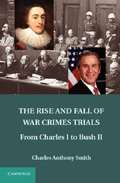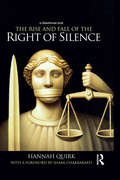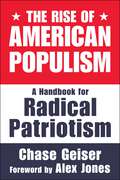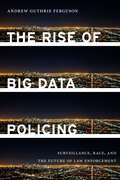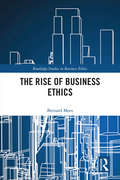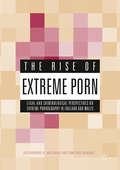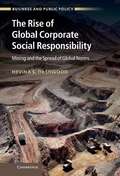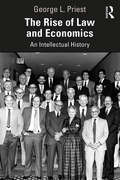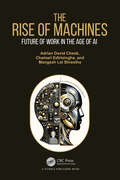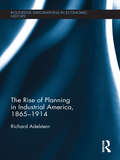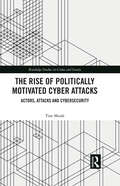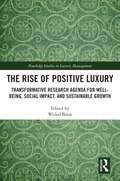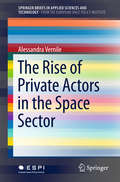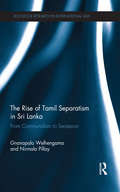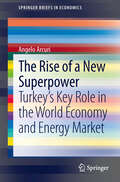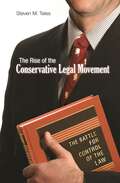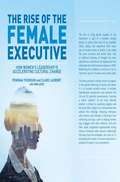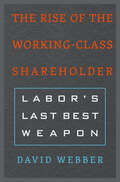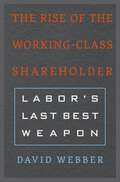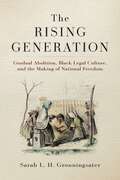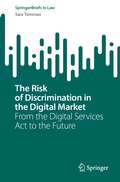- Table View
- List View
The Rise and Fall of United Grain Growers: Cooperatives, Market Regulation, and Free Enterprise
by Paul D. EarlFor much of the twentieth century, United Grain Growers was one of the major forces in Canadian agriculture. Founded in 1906, for much of its history UGG worked to give western farmers a “third way” between the competing poles of cooperatives like the Saskatchewan Wheat Pool and the private sector. At its peak, more than 800 UGG elevators dotted the Canadian prairies and the company had become a part of western Canada’s cultural psyche. By 2001, then known as Agricore United, it was the largest grain company on the Prairies. The UGG’s history illuminates many of the intense debates over policy and philosophy that dominated the grain industry. After the Second World War, it would be a key player as the western Canadian grain industry expanded into new international markets. Through the rest of the century, it played an important role in resolving major disputes over regulation and grain transportation policy. Despite its many innovations, the company’s final decade and eventual demise illustrated the tensions at the heart of the grain industry. In 1997, to finance the rebuilding of its grain elevator network, UGG went public and entered equity markets. While successful at first, this strategy also weakened the company’s cooperative structure. In 2007, it was purchased by Saskatchewan Pool in a hostile takeover. The disappearance of Agricore United marked the end of a century of voluntary farmer-control of the grain business in western Canada. Paul Earl’s history reveals UGG’s central role in the growth and transformation of the western grain industry at a critical period. With meticulous research supplemented by interviews with many of the key players, he also delves into the details and the debates over the company’s demise.
The Rise and Fall of War Crimes Trials
by Charles Anthony SmithThis book is the first comprehensive analysis of the politics of war crimes trials. It provides a systematic and theoretically rigorous examination of whether these trials are used as tools for political consolidation or whether justice is their primary purpose. The consideration of cases begins with the trial of Charles I of England and goes through the presidency of George W. Bush, including the trials of Saddam Hussein and those arising from the War on Terror. The book concludes that political consolidation is the primary concern of these trials - a point that runs contrary to the popular perception of the trials and their stated justification. Through the consideration of war crimes trials, this book makes a contribution to our understanding of power and conflict resolution and illuminates the developmental path of war crimes tribunals.
The Rise and Fall of the Right of Silence: Principle, Politics and Policy
by Hannah QuirkWithin an international context in which the right to silence has long been regarded as sacrosanct, this book provides the first comprehensive, empirically-based analysis of the effects of curtailing the right to silence. The right to silence has served as the practical expression of the principles that an individual was to be considered innocent until proven guilty, and that it was for the prosecution to establish guilt. In 1791, the Fifth Amendment to the US Constitution proclaimed that none ‘shall be compelled in any criminal case to be a witness against himself’. In more recent times, the privilege against self-incrimination has been a founding principle for the International Criminal Court, the new South African constitution and the ad hoc International Criminal Tribunals for Rwanda and the former Yugoslavia. Despite this pedigree, over the past 30 years when governments have felt under pressure to combat crime or terrorism, the right to silence has been reconsidered (as in Australia), curtailed (in most of the United Kingdom) or circumvented (by the creation of the military tribunals to try the Guantánamo detainees). The analysis here focuses upon the effects of the Criminal Justice and Public Order Act 1994 in England and Wales. There, curtailing the right to silence was advocated in terms of ‘common sense’ policy-making and was achieved by an eclectic borrowing of concepts and policies from other jurisdictions. The implications of curtailing this right are here explored in detail with reference to England, Wales and Northern Ireland, but within a comparative context that examines how different ‘types’ of legal systems regard the right to silence and the effects of constitutional protection.
The Rise of American Populism: A Handbook for Radical Patriotism
by Chase GeiserThe Rise of American Populism is a captivating exploration into the evolving landscape of American politics. This insightful book delves deep into the ongoing clash between traditional American values and the emerging globalist ideologies. From Chase Geiser, a writer for InfoWars and with a foreword from Alex Jones, the book offers a robust critique of the current state of American democracy, examining the cultural, economic, and political shifts that have shaped the nation. With a focus on the resurgence of populism, the book passionately advocates for a renewed sense of patriotism and individualism. It critically assesses the influence of globalist organizations on American sovereignty, urging a return to national interests and values. Written in a compelling and assertive style, this book is a call to action, seeking to inspire and mobilize those who share a deep concern for the future of America.The Rise of American Populism is not just a critique, but a bold statement on the importance of preserving American ideals in an ever-changing world.
The Rise of Big Data Policing: Surveillance, Race, and the Future of Law Enforcement (Goldstein-Goren American Jewish History)
by Andrew Guthrie FergusonPROSE Award Winner in Law & Legal Studies:&“Essential reading for anyone who wants to understand how technology is changing American policing.&” —Kirkus Reviews (starred review) In a command center in downtown Los Angeles, a digital map lights up with 911 calls, TV monitors track breaking news, surveillance cameras sweep the streets, and rows of computers link analysts and police officers to a wealth of intelligence. This is just a glimpse into a future where software predicts crimes, algorithms generate &“most-wanted&” lists, and databanks collect personal and biometric information. The Rise of Big Data Policing introduces the cutting-edge technology that is changing how the police do their jobs and shows why it is crucial that citizens understand the far-reaching consequences of big data surveillance as a law enforcement tool. Andrew Guthrie Ferguson reveals how these technologies —viewed as race-neutral and objective—have been eagerly adopted by police departments hoping to distance themselves from claims of racial bias and unconstitutional practices. After a series of high-profile police shootings and federal investigations into systemic misconduct, and in an era of law enforcement budget cutbacks, data-driven policing has been billed as a way to turn the page on racial bias. But behind the data are real people, and difficult questions remain. This groundbreaking book examines how new technologies will alter who, where, when, and how we police, and how they also offer data-driven methods to improve police accountability—and remedy underlying socio-economic risk factors that encourage crime. It is a must read for understanding how technology will revolutionize law enforcement—and its potential threat to the security, privacy, and constitutional rights of citizens. &“Ferguson teaches us not only the fault lines in how police watch us, but how we can turn the tables to use new algorithms to watch the police. At stake is nothing less than individual liberty and the democratic control of policing.&”—Jeffrey Fagan, Isidor and Seville Sulzbacher Professor of Law, Columbia University &“Ferguson has an incredible command of the many subjects that fall under the &‘big data&’ umbrella.&”—Gizmodo &“Will be indispensable to [anyone] interested in the practice of policing.&”—Library Journal
The Rise of Business Ethics (Routledge Studies in Business Ethics)
by Bernard MeesIn 1973, Daniel Bell argued that corporations in post-industrial societies increasingly needed to behave in accord with widely accepted social norms, particularly in terms of ethical behavior and social responsibility. Yet widespread criticism of business behavior was not an invention of the 1960s and 70s or a product of changing commercial norms. The key feature historically has been business scandal. Understandings of how the field of business ethics has emerged are undeveloped, however. This book is the first attempt to explain the conditions which saw a focus develop on business ethics especially in the 1960s and 70s, and how the broader field developed to encompass related notions such as corporate governance, corporate social responsibility, ethical leadership, sustainable business and responsible management education. The Rise of Business Ethics provides an introduction and analysis of the key developments in contemporary business ethics by examining them in terms of their diachronic development – the key thinkers, the key issues, the key institutions and how they each contributed to contemporary understandings of business ethics, governance and practice. Addressing the topic from a European as well as North American perspective, The Rise of Business Ethics will be of interest to researchers, academics, and students in the fields of business ethics, business and society, business history, organization studies and political economy.
The Rise of Extreme Porn
by Alexandros K. Antoniou Dimitris AkrivosThis book analyses the criminalisation of the possession of extreme pornography through ss 63-68 of the Criminal Justice and Immigration Act 2008. It documents the legislative history of the offence and offers a criminological perspective on the role of the media in the construction of the extreme pornography problem. It evaluates the elements of the s 63 offence and critically reflects upon their weaknesses. Moreover, the book presents an up-to-date account of the number of prosecutions initiated and convictions obtained under s 63 since it came into force, alongside an exploration into the corresponding sentencing trends. The first study of its kind in England and Wales since the controversial legal provisions at issue came into effect in 2009, this book contributes new evidence to the application of the extreme pornography provisions and will play an important role in shaping debates on the prosecution of similar offences in the coming years. This book will serve as an invaluable resource to all those with an interest in law, criminology, sociology of deviance, sexuality and pornography studies.
The Rise of Gay Rights and the Fall of the British Empire: Liberal Resistance and the Bloomsbury Group
by David A. J. RichardsThis book argues that there is an important connection between ethical resistance to British imperialism and the ethical discovery of gay rights. By closely examining the roots of liberal resistance in Britain and resistance to patriarchy in the United States, this book shows that fighting the demands of patriarchal manhood and womanhood plays an important role in countering imperialism. Advocates of feminism and gay rights (in particular, the Bloomsbury Group in Britain) play an important public function in the criticism of imperialism because they resist the gender binary's role in rationalizing sexism and homophobia in both public and private life. The connection between the rise of gay rights and the fall of empire illuminates larger questions of the meaning of democracy and of universal human rights as shared human values that have appeared since World War II. The book also casts doubt on the thesis that arguments for gay rights must be extrinsic to democracy, and that they must reflect Western, as opposed to "African" or "Asian," values. To the contrary, gay rights arise from within liberal democracy, and its critics polemically use such opposition to cover and rationalize their own failures of democracy.
The Rise of Global Corporate Social Responsibility
by Hevina S. DashwoodCombining insights from international relations theory with institutional approaches from organization theory and public policy, this book provides a complete explanation for the adoption of Corporate Social Responsibility (CSR), showing how global norms influenced CSR adoption in the mining industry. Global normative developments have clearly had an important influence on major mining companies: by the mid 2000s the majority had adopted sustainable development as a normative frame for their CSR policies and practices. However, there is significant variation between firms in terms of the timing, degree of commitment and the willingness to assume a leadership role in promoting global standards for the mining industry. The author finds that attributes internal to the firm, including the critical role of leadership, and the way in which management responds to the institutional context and operational challenges faced in different countries are important influences on CSR adoption and important factors explaining variation.
The Rise of Law and Economics: An Intellectual History
by George L. PriestThis is a history—though, intentionally, a brief history—of the rise of law and economics as a field of thought in the U.S. college and law school academy, though the field has expanded to Europe and South America and will expand further as other legal systems develop. This book explains the origins of the field and the sources of its growth during its formative period. It describes the intellectual roots of the field, and the field’s relationship to the understanding of the role of the legal system in directing the functioning of the economy. It describes the effect of the Great Depression and the expansion of governmental power on advancing the functional approach. The book then addresses the work of Aaron Director, during the late 1950s, on focusing economic analysis as a means of understanding the effects of the legal and regulatory system on the allocation of resources in the society. Then it turns to the subsequent intellectual founders of the field—Ronald Coase, Guido Calabresi, and Richard Posner—and attempts to explain the significance of their work. It also discusses the efforts of Robert Bork and Henry Manne toward the influence of law and economics on public policy. The book ends with the founding of the American Law and Economics Association in 1991. This is an essential companion to law and economics texts for undergraduate law and economic students and, especially, a general supplement to first-year casebooks for law school students.
The Rise of Machines: Future of Work in the Age of AI
by Adrian David Cheok Chamari Edirisinghe Mangesh Lal ShresthaThis book provides an in-depth look at the impact of artificial intelligence (AI) on the future of work. The rise of AI and automation is transforming the world of work, and the book explores the implications of this transformation on jobs and skills. It begins by introducing readers to the basics of AI technology and its various applications in the workplace. It then moves on to examine the impact of AI on jobs and skills, including the changing nature of work and the potential for job loss due to automation. It also delves into the ethical implications of AI in the workplace, including the moral and ethical questions that arise when AI is used to make decisions that affect people's lives.Besides exploring the impact of AI on the workforce, the book provides practical advice for preparing for the future of work in the age of AI. This includes the importance of reskilling and upskilling, as well as strategies for adapting to the changing world of work in the age of AI. It concludes with a future outlook, exploring the likely direction of the workforce in the years to come and the importance of preparing for the future with a proactive approach to AI and the workforce. This book provides a comprehensive and accessible look at the impact of AI on the future of work. It is ideal for anyone interested in understanding the implications of AI on the workforce and preparing for the future of work in the age of AI.
The Rise of Modern Judicial Review: From Judicial Interpretation to Judge-made Law
by Christopher WolfeHistory of judicial review which shows how modern courts used their power to create new "rights" with fateful political consequences.
The Rise of Planning in Industrial America, 1865-1914 (Routledge Explorations In Economic History Ser. #54)
by Richard AdelsteinCentral economic planning is often associated with failed state socialism, and modern capitalism celebrated as its antithesis. This book shows that central planning is not always, or even primarily, a state enterprise, and that the giant industrial corporations that dominated the American economy through the twentieth century were, first and foremost, unprecedented examples of successful, consensual central planning at a very large scale.
The Rise of Politically Motivated Cyber Attacks: Actors, Attacks and Cybersecurity (Routledge Studies in Crime and Society)
by Tine MunkThis book outlines the complexity in understanding different forms of cyber attacks, the actors involved, and their motivations. It explores the key challenges in investigating and prosecuting politically motivated cyber attacks, the lack of consistency within regulatory frameworks, and the grey zone that this creates, for cybercriminals to operate within. Connecting diverse literatures on cyberwarfare, cyberterrorism, and cyberprotests, and categorising the different actors involved – state-sponsored/supported groups, hacktivists, online protestors – this book compares the means and methods used in attacks, the various attackers, and the current strategies employed by cybersecurity agencies. It examines the current legislative framework and proposes ways in which it could be reconstructed, moving beyond the traditional and fragmented definitions used to manage offline violence. This book is an important contribution to the study of cyber attacks within the areas of criminology, criminal justice, law, and policy. It is a compelling reading for all those engaged in cybercrime, cybersecurity, and digital forensics.
The Rise of Positive Luxury: Transformative Research Agenda for Well-being, Social Impact, and Sustainable Growth (Routledge Studies in Luxury Management)
by Wided BatatOffering a holistic approach to positive luxury, this comprehensive book provides a novel framework grounded in the new paradigm of Transformative Luxury Research (TLR) stream. TLR helps luxury businesses and researchers develop in-depth knowledge about the mechanisms and factors that shape the future of positive luxury thinking and doing while promoting collective and individual well-being outcomes, social justice, eco-friendly practices, and sustainable growth, involving various stakeholders, communities, and institutions across developed and developing countries. Through a wide range of empirical, methodological, and theoretical contributions, examining the social, environmental, organizational, political, and cultural issues in responsible luxury marketing, this book explores the relationship between luxury consumption, production, and well-being outcomes. It offers a comprehensive overview of how luxury businesses can transform their practices and thus play an active role in promoting positive luxury within the industry and beyond along with enhancing their competitiveness, innovation, and profitability. The idea of well-being outcomes and sustainable growth, as applied in the TLR agenda, calls for synergistic theoretical and practical approaches. The content of this book, through different exciting chapters, will generate novel ideas to promote positive luxury business models leading luxury firms to transform their practices by advancing the current understanding of ethical and responsible business practices, which contribute to individual and collective well-being within the luxury field.
The Rise of Private Actors in the Space Sector (SpringerBriefs in Applied Sciences and Technology)
by Alessandra VernileThis book provides a broad set of information and data on the rise of private actors in the space sector, organized into different topics covering the various trends that have shaped the space sector during the last decade. The book, written in a descriptive fashion, concludes with recommendations for future analytical research on the topic.
The Rise of Tamil Separatism in Sri Lanka: From Communalism to Secession (Routledge Research in International Law)
by Gnanapala Welhengama Nirmala PillayAmong the examples of civil wars, armed secessionist movements and minority uprisings in the world today, many involve conflict between a minority group’s aim for political self-determination, and the nation state’s resistance to any diminution of sovereignty. With the expansion of the international regime of human rights, minority groups have reconceptualised their struggle with the understanding that a minority which is linguistically, religiously or ethnically distinctive is entitled to self-determination if their aspirations cannot be met. This book explores the relationship between minority rights, self-determination and secession within international law, by contextualising these issues in a detailed case study of the rise of Tamil separatism in Sri Lanka. Welhengama and Pillay show how Tamil communalism hardened into secession and assess whether the Sri Lankan government has met its obligations with respect to the right to self-determination short of secession. Focusing on the legal and human rights arguments for secession by the Tamil community of the North and East of Sri Lanka, the book demonstrates how the language of international law and international human rights played a major role in the development of the arguments for secession. Through a close examination of the case of the Tamil’s secessionist movement the book presents valuable insights into why modern nation states find themselves threatened by separatist claims and bids for independence based on ethnicity.
The Rise of a New Superpower
by Angelo ArcuriThe book explains the reasons for the recent economic success of Turkey by examining the transformation of the private sector and the development policies implemented by the Turkish government. Further concrete insights are provided by professionals working for institutional and business players such as SACE, the first Italian insurance group in the field of export credit, and ABIGEM, a business center supporting SMEs in Turkey. Turkish Airlines, winner of the Best Airline in Europe award in 2012, also contributed to the volume through useful information provided by its press office. Turkey's strategic role in the energy market is then analyzed, with discussion of the limits and opportunities of the oil, gas, and renewable sectors. In addition, careful attention is paid to the difficult relations between Turkey and the European Union and to Turkey's application for EU membership. Turkey is one of the most important emerging countries in the world thanks to the booming economic growth that has been achieved there during the past decade. This book analyzes the increasingly key role played by Turkey within the international community by focusing on two main issues: the economic scenario and the energy market.
The Rise of the Conservative Legal Movement: The Battle for Control of the Law (Princeton Studies in American Politics: Historical, International, and Comparative Perspectives #110)
by Steven M. TelesStarting in the 1970s, conservatives learned that electoral victory did not easily convert into a reversal of important liberal accomplishments, especially in the law. As a result, conservatives' mobilizing efforts increasingly turned to law schools, professional networks, public interest groups, and the judiciary--areas traditionally controlled by liberals. Drawing from internal documents, as well as interviews with key conservative figures, The Rise of the Conservative Legal Movement examines this sometimes fitful, and still only partially successful, conservative challenge to liberal domination of the law and American legal institutions. Unlike accounts that depict the conservatives as fiendishly skilled, The Rise of the Conservative Legal Movement reveals the formidable challenges that conservatives faced in competing with legal liberalism. Steven Teles explores how conservative mobilization was shaped by the legal profession, the legacy of the liberal movement, and the difficulties in matching strategic opportunities with effective organizational responses. He explains how foundations and groups promoting conservative ideas built a network designed to dislodge legal liberalism from American elite institutions. And he portrays the reality, not of a grand strategy masterfully pursued, but of individuals and political entrepreneurs learning from trial and error. Using previously unavailable materials from the Olin Foundation, Federalist Society, Center for Individual Rights, Institute for Justice, and Law and Economics Center, The Rise of the Conservative Legal Movement provides an unprecedented look at the inner life of the conservative movement. Lawyers, historians, sociologists, political scientists, and activists seeking to learn from the conservative experience in the law will find it compelling reading.
The Rise of the Female Executive: How Women's Leadership is Accelerating Cultural Change
by Tom Lloyd Peninah Thomson Clare LaurentProvides a timely review of gender equality in the boardroom, and through interviews with mentors and mentees it illustrates how mentoring can play a part in helping women stay engaged in their career. This book includes international comparisons and an examination of the UK and EU political environments.
The Rise of the Global Company Multinationals and the Making of the Modern World (New Approaches to Economic and Social History)
by Robert FitzgeraldThis is the first full account of how an influential form of commercial organization - the multinational enterprise - drove globalization and contributed to the making of the modern world. Robert Fitzgerald explores the major role of multinational enterprises in the events of world history, from the nineteenth century to the present, revealing how the growth of businesses that operated across borders contributed to an unprecedented worldwide transformation and deepening interdependence between countries. He demonstrates how international businesses shaped the economic development and competitiveness of nations, their politics and sovereignty, and the balance of power in international relations. The Rise of the Global Company uses the lessons of history to question prominent contemporary interpretations of multinationals and their consequences, and offers a truly wide-ranging survey of multinational enterprise, spanning two hundred years and five continents. A survey of multinationals that traces their involvement in the events that determined the histories of nations, the international economy and international relations. Examines multinational enterprise as a major cause of globalization. Places the rise of multinational enterprise within the context of wider events in modern world history.
The Rise of the Working-Class Shareholder: Labor's Last Best Weapon
by David Webber“Riveting . . . contributes wonderfully to a new and ongoing conversation about inequality, dark money, and populism in the electorate.” —Mehrsa Baradaran, author of The Color of MoneyWhen Steven Burd, CEO of the supermarket chain Safeway, cut wages and benefits, starting a five-month strike by 59,000 unionized workers, he was confident he would win. But where traditional labor action failed, a new approach was more successful. With the aid of the California Public Employees' Retirement System, a $300 billion pension fund, workers led a shareholder revolt that unseated three of Burd’s boardroom allies.In The Rise of the Working-Class Shareholder: Labor’s Last Best Weapon, David Webber uses cases such as Safeway’s to shine a light on labor’s most potent remaining weapon: its multitrillion-dollar pension funds. Outmaneuvered at the bargaining table and under constant assault in Washington, statehouses, and the courts, worker organizations are beginning to exercise muscle through markets. Shareholder activism has been used to divest from anti-labor companies, gun makers, and tobacco; diversify corporate boards; support Occupy Wall Street; force global warming onto the corporate agenda; create jobs; and challenge outlandish CEO pay. Webber argues that workers have found in labor’s capital a potent strategy against their exploiters. He explains the tactic’s surmountable difficulties even as he cautions that corporate interests are already working to deny labor’s access to this powerful and underused tool.The Rise of the Working-Class Shareholder is a rare good-news story for American workers, an opportunity hiding in plain sight. Combining legal rigor with inspiring narratives of labor victory, Webber shows how workers can wield their own capital to reclaim their strength.“Weaves narratives of activist campaigns (pension fund administrators, union staffers, and government comptrollers are the book’s unlikely heroes) with fine-grained analysis of the relevant legal and financial concepts in accessible prose.” —Publishers Weekly
The Rise of the Working-Class Shareholder: Labor’s Last Best Weapon
by David WebberWhen Steven Burd, CEO of the supermarket chain Safeway, cut wages and benefits, starting a five-month strike by 59,000 unionized workers, he was confident he would win. But where traditional labor action failed, a novel approach was more successful. With the aid of the California Public Employees’ Retirement System, a $300 billion pension fund, workers led a shareholder revolt that unseated three of Burd’s boardroom allies. In The Rise of the Working-Class Shareholder: Labor's Last Best Weapon, David Webber uses cases such as Safeway’s to shine a light on labor’s most potent remaining weapon: its multitrillion-dollar pension funds. Outmaneuvered at the bargaining table and under constant assault in Washington, state houses, and the courts, worker organizations are beginning to exercise muscle through markets. Shareholder activism has been used to divest from anti-labor companies, gun makers, and tobacco; diversify corporate boards; support Occupy Wall Street; force global warming onto the corporate agenda; create jobs; and challenge outlandish CEO pay. Webber argues that workers have found in labor’s capital a potent strategy against their exploiters. He explains the tactic’s surmountable difficulties even as he cautions that corporate interests are already working to deny labor’s access to this powerful and underused tool. The Rise of the Working-Class Shareholder is a rare good-news story for American workers, an opportunity hiding in plain sight. Combining legal rigor with inspiring narratives of labor victory, Webber shows how workers can wield their own capital to reclaim their strength.
The Rising Generation: Gradual Abolition, Black Legal Culture, and the Making of National Freedom (Early American Studies)
by Sarah L. GronningsaterChronicles the history of emancipation through the cradle-to-grave experiences of a remarkable generation of black northernersThe Rising Generation chronicles the long history of emancipation in the United States through the cradle-to-grave experiences of a generation of black New Yorkers. Born into precarious freedom after the American Revolution and reaching adulthood in the lead-up to the Civil War, this remarkable generation ultimately played an outsized role in political and legal conflicts over slavery’s future, influencing both the nation’s path to the Civil War and changes to the US Constitution.Through exhaustive research in archives across New York State, where the largest enslaved population in the North resided at the time of the American Revolution, Sarah L. H. Gronningsater begins by exploring how English colonial laws shaped late eighteenth-century gradual abolition acts that freed children born to enslaved mothers. The boys and girls affected by these laws were born into a quasi-free legal status. They were technically not enslaved but were nonetheless required to labor as servants until they reached adulthood. Parents, teachers, and mentors of these “children of gradual abolition” found multiple ways to protect and nurture the boys and girls in their midst. They supported and founded schools, formed ties with white lawyers and abolitionists, petitioned local and state officials for better laws, guarded against kidnapping and cruelty, and shaped New York’s evolving identity as a free state. Black fathers used their votes during annual state elections in the early 1800s to influence legislative antislavery efforts. After many but not all black men in the state were disfranchised by a race-based property requirement in 1822, black citizens across New York organized to regain equal suffrage and to expand and protect other crucial, non-gendered features of state citizenship. Women and children were critical participants in these efforts.Gronningsater shows how, as the children of gradual abolition reached adulthood, they took the lessons of their youth into midcentury campaigns for legal equality, political inclusion, equitable common school education, and the expansion of freedom across the nation.
The Risk of Discrimination in the Digital Market: From the Digital Services Act to the Future (SpringerBriefs in Law)
by Sara TommasiThe book starts with an analysis of what is new in the Digital Services Act. The aim is to see whether this new Regulation is appropriate both for not halting technological innovation and for addressing the risks that technological innovation poses to society and to the people who use digital services. The focal point is the risk of discrimination as people are often helpless in the face of the potential discriminations in the digital services sector. In particular, the book analyses how the Digital Services Act can make a concrete contribution to the protection against discrimination. To this end, it focuses on the responsibility of digital service providers and the fact that discrimination may also depend on the way in which algorithms and artificial intelligence systems are used. Therefore, a comparison is made between the Digital Services Act and the proposed Artificial Intelligence Act. The comparison discloses that the risk-based approach is the common thread followed by the EU in regulating the digital market. The book elaborates also on the practical implications of the risk-based approach. Highlighting advantages and limitations leading the author to conclude that the risk-based approach is the way forward only if the differences between risk and danger, the limits of law, and the limits of the tendency to humanise artificial intelligence systems are considered. With specific reference to the risk of discrimination, the need for a systemic and multi-level approach is highlighted, which reinforces the contribution that can be made not only by the Digital Services Act, but also by more general and cross-cutting legislation as those on data protection and unfair commercial practices.

